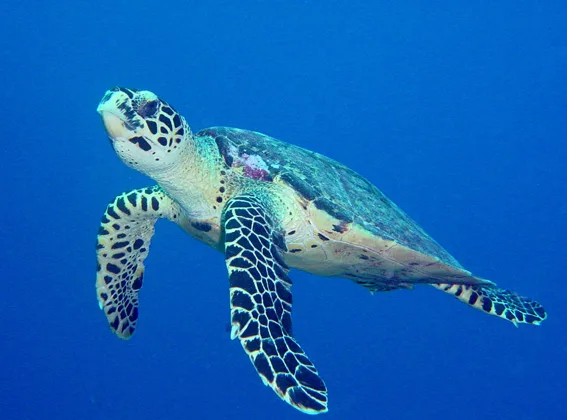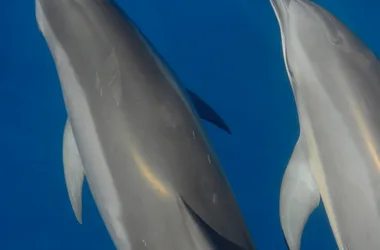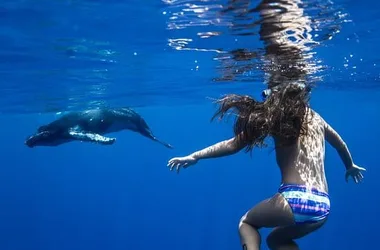Moorea Deep Blue
Dolphin and whale watching
The excursion lasts between 3 and 4 hours approximately and is divided into 3 stages: a morning tour and an afternoon tour,
– Stage 1: stop on the sandbank to swim with stingrays and Pointe Noire sharks (we do not feed).
– Stage 2: walk in a pass to observe the dolphins from the boat
– Stage 3 (the longest) trip on the high seas to search for and observe the whales from the boat and launch if the conditions allow it to swim with the whales.
On board, you are accompanied by a captain and a guide, both are regularly trained in first aid at sea.
The order of the steps can be changed. Our priority is whale watching from the boat and by swimming (there is no obligation to go into the water).
If the captain hears that a humpback whale is very close to the starting point, he may take you there directly and do the other stops at the end of the excursion. (or not depending on timing and time spent whale watching)
During the period of navigation to go to the high seas, the guide gives you a whole lot of explanations: on the course of the excursion, on the safety rules, on the cetaceans, including those that you can meet during the excursion (it happens that we come across other species), etc. You are invited to ask all the questions you want, the guide is there for you.
Regarding the launch, the guide is with you in the water to place you in the best observation conditions and for your safety. There may even be several launches on the trip. On the other hand, it also happens that it is impossible to do so, it depends on the weather conditions, and, above all, on the behavior of the cetaceans, a whale that is too fleeing for example. The rules for approaching marine animals in Polynesia are very strict. It is also forbidden free dive or scuba dive with cetaceans.
Cetaceans are wild animals. During the research phase, their observation or launching is not guaranteed, as is the good weather!
– Stage 1: stop on the sandbank to swim with stingrays and Pointe Noire sharks (we do not feed).
– Stage 2: walk in a pass to observe the dolphins from the boat
– Stage 3 (the longest) trip on the high seas to search for and observe the whales from the boat and launch if the conditions allow it to swim with the whales.
On board, you are accompanied by a captain and a guide, both are regularly trained in first aid at sea.
The order of the steps can be changed. Our priority is whale watching from the boat and by swimming (there is no obligation to go into the water).
If the captain hears that a humpback whale is very close to the starting point, he may take you there directly and do the other stops at the end of the excursion. (or not depending on timing and time spent whale watching)
During the period of navigation to go to the high seas, the guide gives you a whole lot of explanations: on the course of the excursion, on the safety rules, on the cetaceans, including those that you can meet during the excursion (it happens that we come across other species), etc. You are invited to ask all the questions you want, the guide is there for you.
Regarding the launch, the guide is with you in the water to place you in the best observation conditions and for your safety. There may even be several launches on the trip. On the other hand, it also happens that it is impossible to do so, it depends on the weather conditions, and, above all, on the behavior of the cetaceans, a whale that is too fleeing for example. The rules for approaching marine animals in Polynesia are very strict. It is also forbidden free dive or scuba dive with cetaceans.
Cetaceans are wild animals. During the research phase, their observation or launching is not guaranteed, as is the good weather!
Services
Services






 América del Sur
América del Sur
 Australia
Australia
 Belgique
Belgique
 Brasil
Brasil
 Canada (EN)
Canada (EN)
 Canada (FR)
Canada (FR)
 Deutschland
Deutschland
 España
España
 France
France
 Italia
Italia
 Mexico
Mexico
 Polynésie française
Polynésie française
 New Zealand
New Zealand
 Schweizerisch (DE)
Schweizerisch (DE)
 Suisse (FR)
Suisse (FR)
 United Kingdom
United Kingdom
 United States
United States
 한국
한국
 中国
中国
 日本
日本